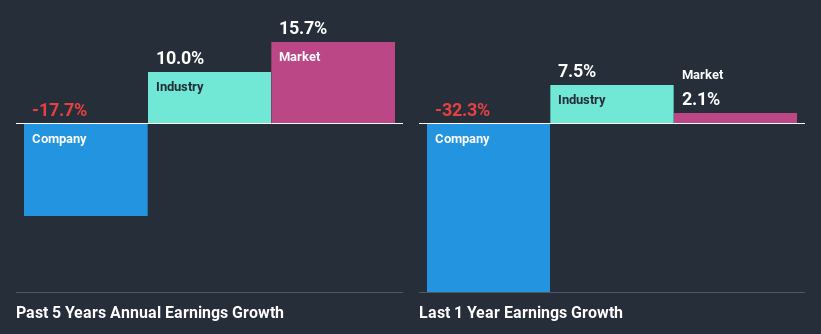Prodigy Ventures Inc. (CVE:PGV) Stock's On A Decline: Are Poor Fundamentals The Cause?

With its stock down 10.0% over the past week, it is easy to disregard Prodigy Ventures (CVE:PGV). To decide if this trend could continue, we decided to look at its weak fundamentals as they shape the long-term market trends. Particularly, we will be paying attention to Prodigy Ventures' ROE today.
ROE or return on equity is a useful tool to assess how effectively a company can generate returns on the investment it received from its shareholders. In simpler terms, it measures the profitability of a company in relation to shareholder's equity.
Check out our latest analysis for Prodigy Ventures
How To Calculate Return On Equity?
The formula for ROE is:
Return on Equity = Net Profit (from continuing operations) ÷ Shareholders' Equity
So, based on the above formula, the ROE for Prodigy Ventures is:
6.6% = CA$200k ÷ CA$3.1m (Based on the trailing twelve months to March 2020).
The 'return' is the income the business earned over the last year. That means that for every CA$1 worth of shareholders' equity, the company generated CA$0.07 in profit.
Why Is ROE Important For Earnings Growth?
So far, we've learned that ROE is a measure of a company's profitability. Depending on how much of these profits the company reinvests or "retains", and how effectively it does so, we are then able to assess a company’s earnings growth potential. Assuming all else is equal, companies that have both a higher return on equity and higher profit retention are usually the ones that have a higher growth rate when compared to companies that don't have the same features.
Prodigy Ventures' Earnings Growth And 6.6% ROE
When you first look at it, Prodigy Ventures' ROE doesn't look that attractive. Next, when compared to the average industry ROE of 15%, the company's ROE leaves us feeling even less enthusiastic. For this reason, Prodigy Ventures' five year net income decline of 18% is not surprising given its lower ROE. However, there could also be other factors causing the earnings to decline. For example, it is possible that the business has allocated capital poorly or that the company has a very high payout ratio.
So, as a next step, we compared Prodigy Ventures' performance against the industry and were disappointed to discover that while the company has been shrinking its earnings, the industry has been growing its earnings at a rate of 5.1% in the same period.
The basis for attaching value to a company is, to a great extent, tied to its earnings growth. What investors need to determine next is if the expected earnings growth, or the lack of it, is already built into the share price. Doing so will help them establish if the stock's future looks promising or ominous. One good indicator of expected earnings growth is the P/E ratio which determines the price the market is willing to pay for a stock based on its earnings prospects. So, you may want to check if Prodigy Ventures is trading on a high P/E or a low P/E, relative to its industry.
Is Prodigy Ventures Efficiently Re-investing Its Profits?
Prodigy Ventures' declining earnings is not surprising given how the company is spending most of its profits in paying dividends, judging by its three-year median payout ratio of 67% (or a retention ratio of 33%). With only very little left to reinvest into the business, growth in earnings is far from likely. You can see the 5 risks we have identified for Prodigy Ventures by visiting our risks dashboard for free on our platform here.
Summary
On the whole, Prodigy Ventures' performance is quite a big let-down. The company has seen a lack of earnings growth as a result of retaining very little profits and whatever little it does retain, is being reinvested at a very low rate of return. Up till now, we've only made a short study of the company's growth data. You can do your own research on Prodigy Ventures and see how it has performed in the past by looking at this FREE detailed graph of past earnings, revenue and cash flows.
This article by Simply Wall St is general in nature. It does not constitute a recommendation to buy or sell any stock, and does not take account of your objectives, or your financial situation. We aim to bring you long-term focused analysis driven by fundamental data. Note that our analysis may not factor in the latest price-sensitive company announcements or qualitative material. Simply Wall St has no position in any stocks mentioned.
Have feedback on this article? Concerned about the content? Get in touch with us directly. Alternatively, email editorial-team@simplywallst.com.


